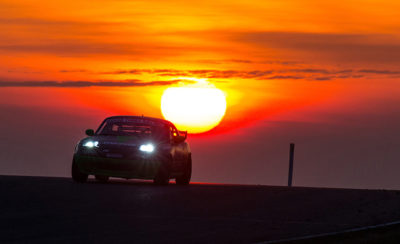The budget endurance racing series is grabbing the attention of many drivers, especially Spec Miata racers
Many a driver has watched the Rolex 24 at Daytona and thought about the challenges and joys of racing from day into night, or vice-versa. But reality hits that they will probably never compete in that great endurance race – or the 12 Hours of Sebring – and they go back to the garage to work on their race car. However, there are series that allow drivers to race twice around the clock on a much more modest budget than that of Mazda Team Joest. One of those is ChampCar, formerly known as ChumpCar until they grabbed up an expired trademark.
The series, the events of which could be 24-hour affairs, or a couple of seven-hour events spread out over two days (or anything in between), have become extremely popular. The chief reason is that in track-time-per-dollar calculations, it’s tough to beat.
“Down here in Florida, if you’re not registered for the Daytona event at least two months prior, you will be on a waiting list that’s anywhere from 10 to 20 cars long, and they cap the list at 128 cars – it’s huge here in the Southeast,” explains Rob Greenwood, who runs prep shop BSI Racing. “A lot of the prep shops down here are starting to build [race cars for ChampCar]. I got into it because a lot of the other Spec Miata drivers said, ‘This is a really fun series, let’s go do it.’ Out of the Miatas that run the class, I’d say half of them are Spec Miata drivers that have teamed up together to go drive for 14 hours.”
Greenwood did one event with Spec Miata-turned-MX-5 Cup driver Selin Rollan, Selin’s father and Todd Buras. That was a 24-hour event at Homestead that started at midnight on New Year’s Eve and ended at midnight on New Year’s Day.
“Driving at nighttime is a real blast for me,” says Rollan. “One of the coolest things for me was I was living in the Homestead area at the time and working at a CPK. I got to Homestead around 11:30 p.m. and watched the start of the race. I was the third driver so I went home – we lived 15 minutes from the track – and took a three-hour nap and got back to the track and was in the car at 5:30 a.m. for my first stint. One of the coolest things was my stint ending in the daytime and I got to drive as the sun was coming up. A race starting in the dark and ending at New Year’s is such a cool concept.”
The rules for ChampCar are pretty simple, and a driver doesn’t need a competition license to race (first-time drivers must attend a no-cost school). The classes are broken down by engine displacement, and each car is assigned a base points value. Each modification carries a certain amount of points, with the idea of not exceeding 500 points in total. Vehicles that have between 500 and 1,000 points will receive penalty laps. The fairly open rule set is the reason that many people build cars specifically for the series rather than using an existing Spec Miata or other car prepared for an SCCA or NASA class.
“Spec Miata is very strict,” says Greenwood. “With ChampCar, you pick a car and it starts out with a base points value. Most shops are running the ’94 Miata and they start with 350 points. Some guys are changing the motor and put ’99s in there, and they carry about a 50-point penalty. The ChampCar we have in the shop weighs 1,950lbs., is making 150hp and still runs the same lap times as Spec Miata because Spec Miatas have a much better suspension. We decided to go a different direction because the Miatas are by all rights great-handling cars.”
The points values for some popular modifications include 75 points for adjustable shocks, 50 points for an aftermarket camshaft, 20 points for a non-OE swaybar and 10 points per corner for non-OE springs.
ChampCar races at tracks all across the country, including VIR, Utah Motorsports Campus, Auto Club Speedway, MSR Houston, Watkins Glen and, of course, Daytona – in total, ChampCar will host 28 events in 2018. Greenwood says if someone has the chance, they should race in one.
“If you get the opportunity, go drive it,” he says. “You’ll have the time of your life. It’s about having fun, not necessarily, ‘I’ve got to beat you and I’ve got to pass you right now.’ It’s 14 hours…[so] if it’s not a 90-percent-chance pass, wait.”


 ACCESSIBILITY
ACCESSIBILITY